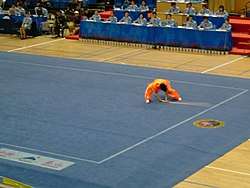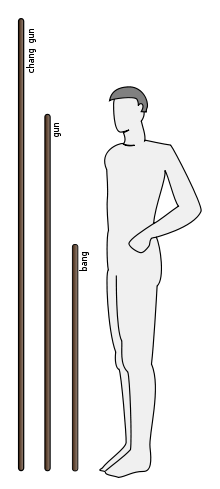Gun (staff)
A gùn (pronunciation [kwə̂n], English approximation: /ɡuən/ gwən, Chinese: 棍; pinyin: gùn; lit.: 'rod, stick') is a long Chinese staff weapon used in Chinese martial arts. It is known as one of the four major weapons, along with the qiang (spear), dao (sabre), and the jian (straight sword). It is called, in this group, "The Grandfather of all Weapons". In Vietnam (as a result of Chinese influence), the gun is known as Côn in Vietnamese martial arts.[1][2][3][4]

Variants and styles

The gun is fashioned with one thick end as the base and a thinner end near the tip, and is cut to be about the same height as the user or 6 foot. Besides the standard gun, there are also flail-like two section and three section varieties of the staff as well as non-tapered heavier variants. Numerous Chinese martial arts teach the staff as part of their curriculum, including (in English alphabetical order):
- Bagua seven star rod (Chinese: 八卦七星竿; pinyin: bāguà qīxīng gān)
- Bailangan, Northern staff (simplified Chinese: 白栏杆; traditional Chinese: 白欄杆; pinyin: bái lángān)
- Nangun, Southern staff (Chinese: 南棍; pinyin: nángùn)
- Pigua Zhang's Feng Mo Gun - 'Frenzied Demon Staff' (劈掛拳 瘋魔棍).
- Shaolin Zhui Feng Gun - 'Wind Chaser Staff' (虎勇敢)
- Qún Yáng Gùn, Shepherd staff (This routine is performed with a straight heavy red oak staff)
- Six and a half point pole (Chinese: 六點半棍)
- Staff of five tigers and goat herds (Chinese: 五虎群羊棍; pinyin: wǔ hǔ qún yáng gùn)
- Taiji staff (simplified Chinese: 太极棍; traditional Chinese: 太極棍; pinyin: tàijí gùn
- Taiji thirteen staff (simplified Chinese: 太极十三秆; traditional Chinese: 太極十三杆; pinyin: tàijí shísān gǎn)
Bailangan and nangun are frequently found in modern exercise and competitions.
Modern staffs are often made from wax wood or rattan, both of which are strong woods, but flexible and light. Some versions may also feature metal or rubber parts.
See also
- Ruyi Jingu Bang, Sun Wukong's weapon
- Ji, halberd
- Bō and Jō, Japanese staves
- Quarterstaff
- Juego del Palo, Canarian (Spanish) staff
- Canne de combat, French staff
- Jogo do Pau, Portuguese staff
References
- http://www.baobinhdinh.com.vn/642/2004/10/15301/
- https://vietnam.vnanet.vn/vietnamese/con-–-binh-khi-doc-dao-cua-vo-co-truyen-viet-nam/101598.html
- http://www.vothuat.vn/su-kien/nhieu-tiet-muc-vo-thuat-dac-sac-tai-buoi-giao-luu-giua-takhado-va-tay-son-vo-dao.html
- https://votaysonbinhdinh.com/cac-lo-vo-tay-son-phan-2-vo-duong-ho-nganh/